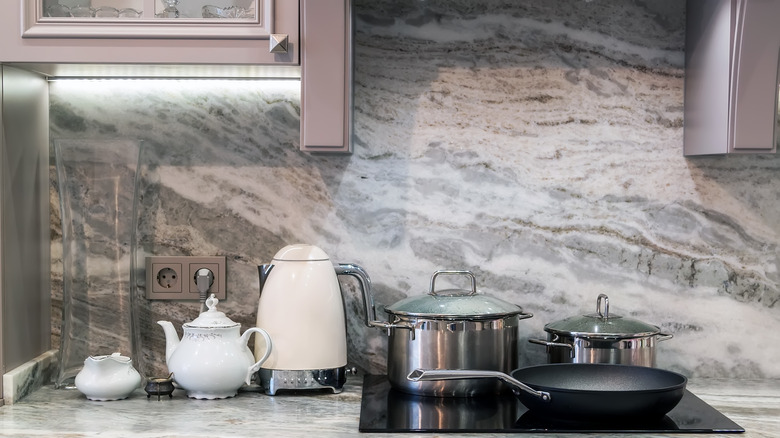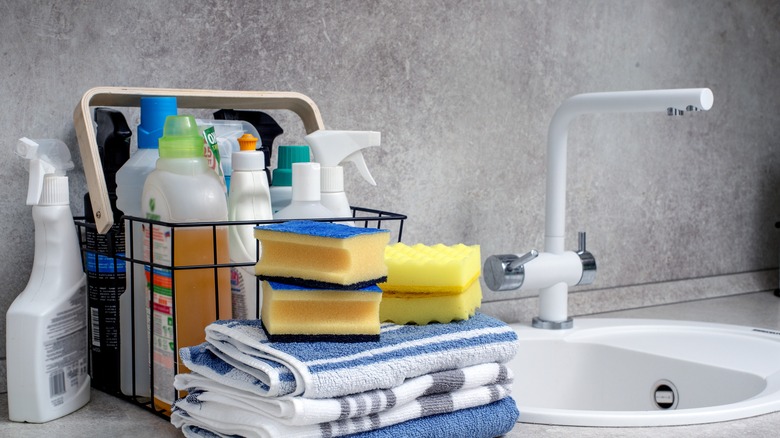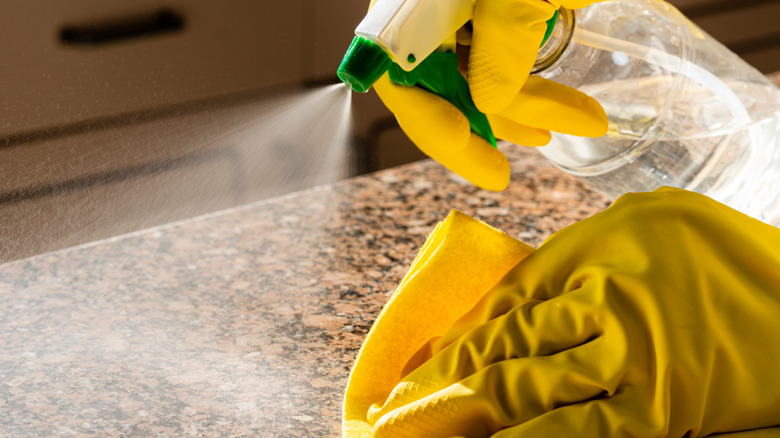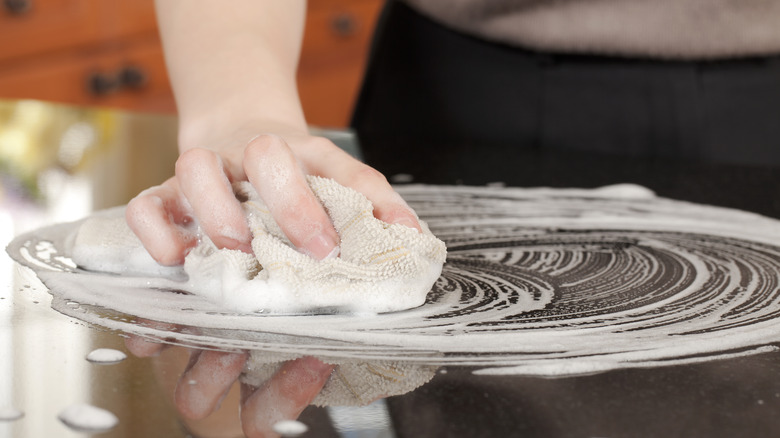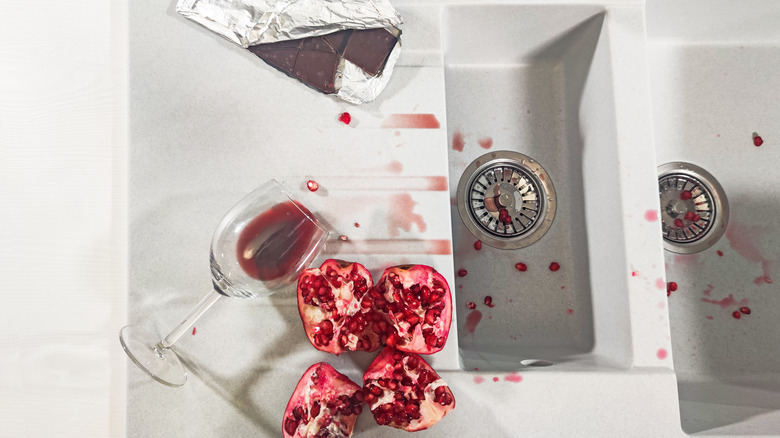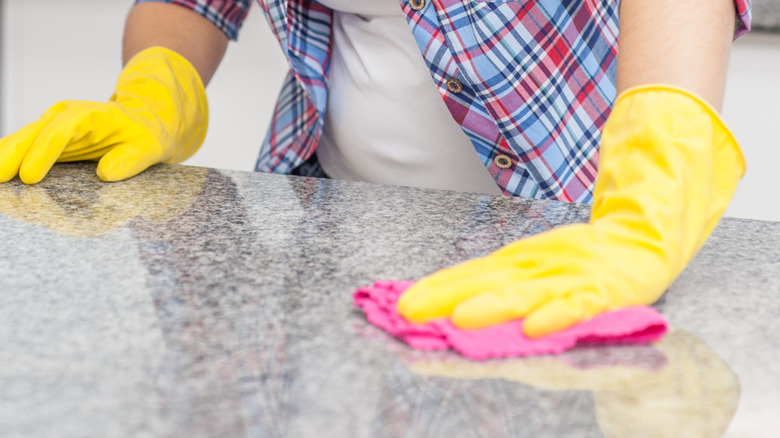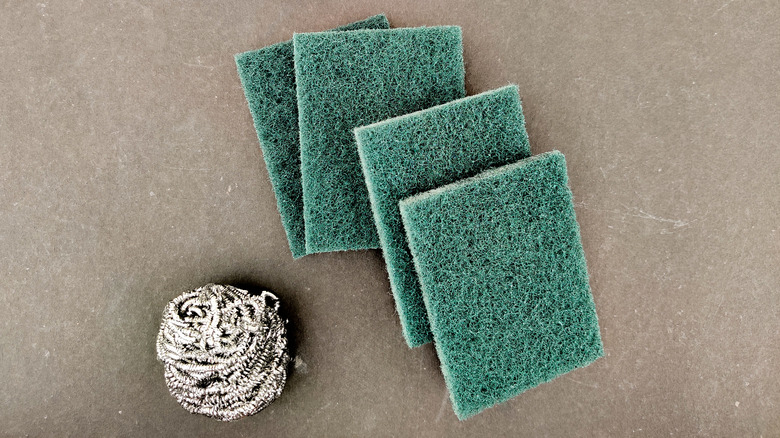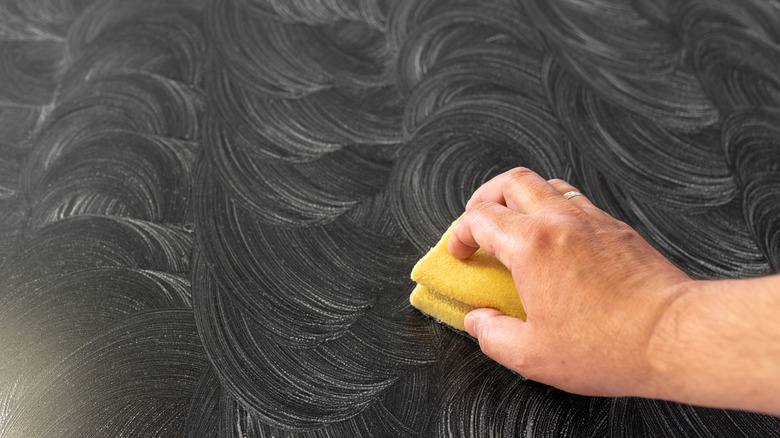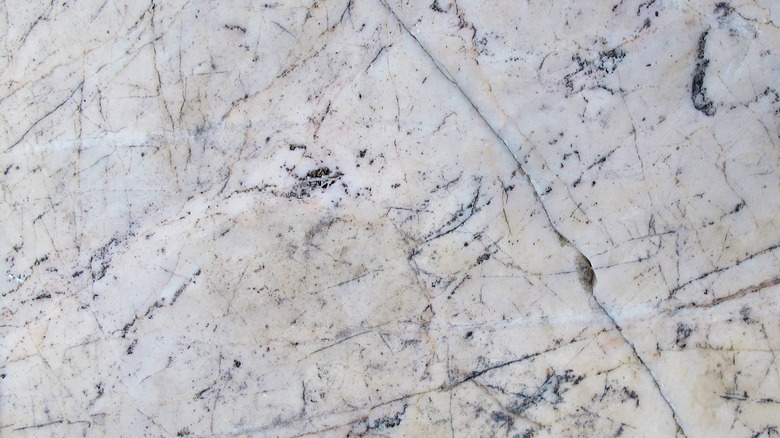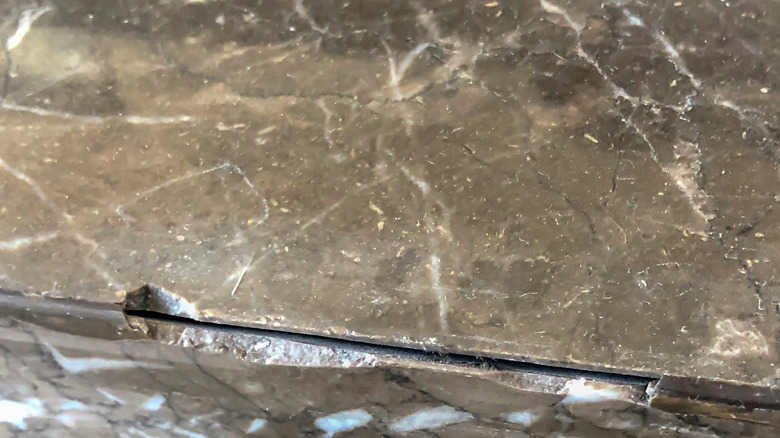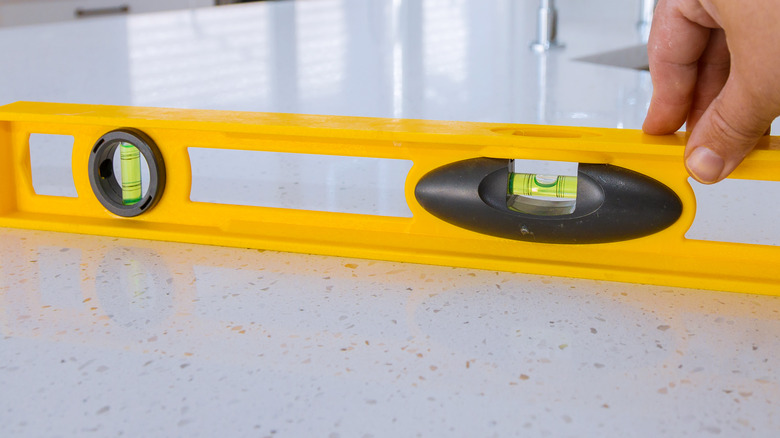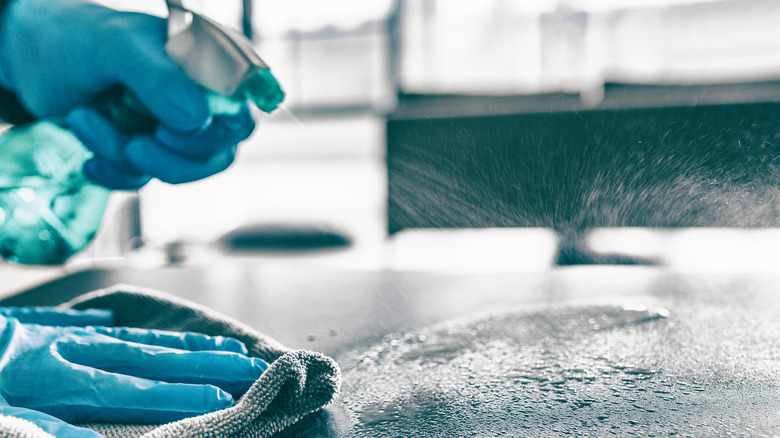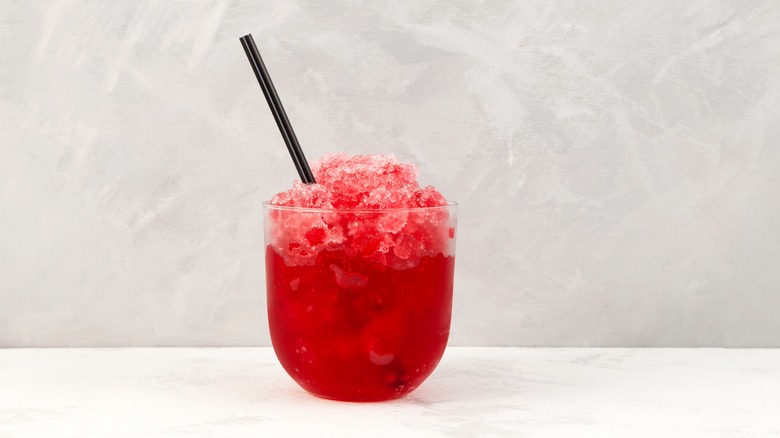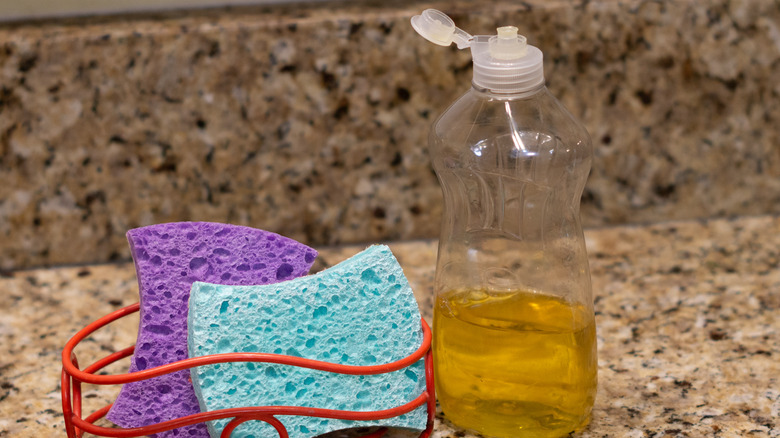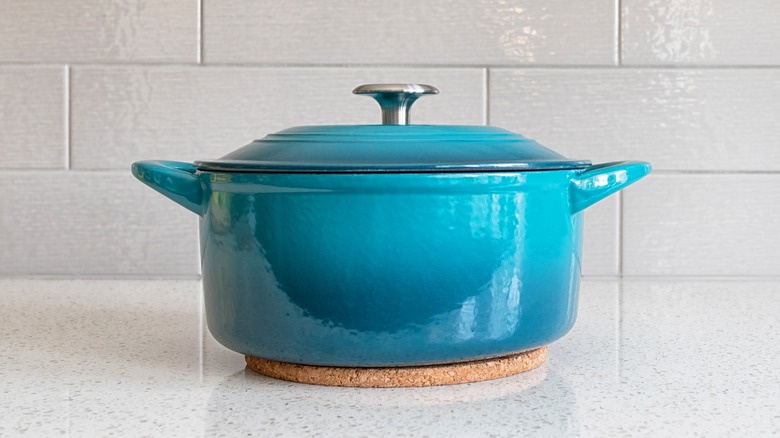How To Keep Your Granite Countertops In Pristine Condition
Granite sometimes gets a bad rap for being difficult and complicated to maintain, but that's not really the case. Natural stone is one of the most durable materials you can use for your countertops. Since it's very hard, granite won't scratch or dent as easily as many other types of countertop, and it shouldn't break under normal use.
While granite is a resilient surface, natural stone is porous, and there are some special ways to care for it to keep it clean and shiny for years. Because granite tends to be tough, the best way to care for it is through preventative measures designed to protect the surface. Aurora Marble & Granite Inc. advises that avoiding chips, discoloration, stains, and other types of damage will keep your countertops looking sleek and glossy for years to come. If you do have an accident, though, there are ways to address it, so don't panic. There are some simple things you can do yourself to correct a mistake, and even if you can't, a professional can likely help you out. The good thing is that since granite is a tenacious substance, it's pretty hard to ruin it.
Never use acids or harsh chemicals to clean
Granite is porous, so the surface can absorb liquids it comes in contact with. If the sealant is rubbed off by the use of harsh chemicals or acids, the surface will be more vulnerable to scratches and stains. Another problem with acids is that they can discolor the surface, as well as undo your polish job.
Rock Doctor points out that cleaners with abrasives in them can actually make tiny scratches in the surface of your granite, causing both a dull appearance and a vulnerability to more damage. Even though you might not see the scratches right away, over time this type of damage can add up. While granite is extremely durable, it's not indestructible, so keep that in mind when selecting a cleaner. If you're not sure what to choose, you can always go with a product specifically made for a granite surface so that you can be sure it's compatible.
Seal your countertops
Since the surface of your granite countertop is made from natural stone, it is porous in its untreated form. Keeping germs, dirt, and liquid out of those pores requires sealing the surface. While most granite countertops will be sealed upon installation, it's a good idea to reseal periodically to make sure that the surface stays protected.
Countertop Specialty advises that granite should be resealed by first cleaning the countertop with acetone or a quality granite cleaner to remove all residue and dirt from the surface. Once that's done, you should pour a small amount of sealer directly onto the surface of the counter, rather than wiping or spraying it on, so that it will completely saturate the surface. Repeat this step until the countertop has been saturated and leave it in place for a few minutes. Once you see evidence of drying, pour more sealer on and spread it onto the surface to make sure the whole area gets thoroughly sealed. The last step is to wipe up any excess sealer and buff the surface with a clean rag or microfiber cloth. Buffing the surface will prevent clouding, so don't skip that part!
Use dish soap and water to clean
For daily cleaning, you don't need a special cleaner or an array of products — just a rag, dish soap, and water will work. Mixing a few drops of dish soap with warm water will do the trick, says Molly Maids. This type of cleaning is gentle on the surface and can help kill germs, too.
Using a clean dish rag or microfiber cloth, drip a few drops of dish soap onto your counter or the cloth, and then use warm water and wipe down the surface. Rinse and wring your cloth every so often to avoid cross contamination. Make sure to use fresh water to wipe down the granite after you're done cleaning with soap, that way you won't end up with soap film on the counter's surface. Once the surface is clean, make sure to dry it with a towel or a dry microfiber cloth so that drops of water don't sit on the countertop for too long. This step is important so that moisture won't seep into the stone and cause staining.
Remove stains before they set in
The first thing to know about stains on your granite countertop is that wiping a spill, rather than blotting, will spread the stain. The Natural Stone Institute advises that knowing what kind of stain you have first will make removing it much easier. For oil-based stains, like cooking oil, milk, or lipstick, a mild household liquid detergent like dish soap, a very diluted bleach mixture, acetone, or mineral spirits should work to break down the stain. You should clean the affected area with a soft cloth and then flush with clean water and dry. For most food spills and coffee stains, you should wipe up the spill and then clean with a 12% hydrogen peroxide solution, followed by rinsing the area with water. For water spots or rings, buff the stain with #0000 steel wool. This method will also work for minor scratches or nicks on the countertop. Proceed with caution when using household cleaners. You should NEVER mix bleach and ammonia together because it makes a potentially lethal toxic gas, and if you survive the experience, it will definitely ruin your countertops.
Disinfect your countertop properly
Keeping your counters clean enough to eat off of is a good practice. Granite can come sealed, but that doesn't mean it's completely impenetrable to germs, especially in the kitchen. Killing germs on granite isn't complicated, though — it just requires different methods than other surfaces.
While they don't always recommend using bleach to disinfect your granite (unless it's heavily diluted), Rock Solid Custom Granite says you can use a 50/50 solution of water and isopropyl alcohol. Using a spray bottle, you should apply this cleaner solution to the countertop and allow it to stand for 3-5 minutes, then rinse the surface with water and dry. You should always use a towel or microfiber cloth to keep your counters shiny after cleaning and avoid damaging the finish. This method is much safer than using bleach, which can be safe if heavily diluted and immediately rinsed off the surface, but always carries a risk of discoloring natural stone.
Never use abrasive sponges or scouring pads
Granite countertops will keep their shine for years if they're well cared for, but they can be damaged by abrasives. This includes abrasive sponges, scouring pads, and cleaners with harsh chemicals added to them. Not only are these types of tools unnecessary for cleaning granite, but they can actually wreck your countertops.
Granite Gold, Inc. warns that abrasives will immediately leave visible scratches on your countertop once they are rinsed. In addition to causing scratches, harsh scrubbing will also remove the sealant from the counter's surface. There is a wide variety of granite-friendly cleansers and polishes that won't damage your counters, so it's better to go with one of those to avoid ruining the finish. Sealant is important to keeping counters clean because it helps to repel stains and prevent harm. If you find that your sealer is worn down, resealing may need to be done to prevent further damage.
Polish your countertops to make them shine
Over time, granite counters can lose their shine with use. Even with the most proper care, the finish can wear off, and in a kitchen, it's nearly impossible to avoid all scratches and nicks. Re-polishing the surface of a granite countertop doesn't need to be done frequently, but luckily it's something that you can do yourself when necessary.
There are two types of polish for granite: polishing powder, sometimes referred to as stone polishing compound, and polishing cream. Going Granite, Inc. advises using polishing powder with a buff polishing pad if you are using it dry, or a muslin polishing wheel when using the powder wet. To select the right type of granite polish, you should choose one that is intended for the color of your particular granite. Polishing powder comes in different varieties for different colors of granite. To use polishing cream, apply the cream with a hog's hair buffing pad. Once the whole surface is polished, you should thoroughly rinse the countertop and dry it before resealing the surface.
Avoid chipping or cracking your counters while cooking
As mentioned earlier, prevention is the name of the game when caring for your granite countertops. Common kitchen implements can scratch or scar your counter's surface if you're not careful, so certain things should not be used directly on the countertop. Emco-Williams, Inc. warns that while tempting, knives shouldn't be used directly on a natural stone surface. Not only can knives cut, scratch, and chip the countertop, but it will dull your knives as well. Using a proper cutting board is always the way to go. Colored liquids — like sports drinks, wine, coffee, and soda — can all stain your granite. Use a coaster and always wipe up spills right away. Acidic cleaners and abrasives also make their list, for all the reasons we've discussed here, and raw meat is also frowned upon because it can stain and also leave bacteria behind on your stone counter. The last item on the Emco-Williams list to keep off your countertops is human beings. That's right, the weight of a person can crack your countertop, so keep both feet on the floor or use a step stool to reach those high shelves.
Repair chips immediately
Granite countertops are very durable, though they can still get chips. But don't worry! Most chips can be repaired and bring your counters back to looking like new. There is even a way to do your own repair if you're comfortable using epoxy and a few tools.
The granite fabrication experts at Mr. Stone emphasize that you don't need to panic over a chipped surface. There are some fixes for chips that don't involve installing a new counter, and this will save you worry, as well as money. For a repair, clear off the countertop and clean the area around the chip. Using supplies from a granite countertop repair kit, fill in the chip with gel epoxy and then spray on epoxy hardener. Use a gentle cloth to wipe away any hardener from adjacent surfaces and then let the epoxy thoroughly cure. Once the epoxy is dry, smooth out the surface with a razor blade so that the repair is flush with the countertop. Once that's done, buff the area with steel wool and then polish to restore the shine.
Call in a professional
Granite surfaces aren't hard to care for, but there are particular things they're susceptible to, such as acids and abrasives. These things can cause damage over time, and no matter how careful you are, accidents are bound to happen (especially when dealing with countertops in a kitchen). When the damage to your countertop is beyond what you are comfortable tackling on your own, you can always call in a professional refinishing contractor.
Some damage will be beyond even a skilled DIYer. If there is etching from acidic cleaners, or the surface has become dull beyond what a polishing pad can fix, you should call a pro, according to Daltile. A stone finishing expert will use industrial strength tools to resurface the entire countertop. Having a refinishing job done by a professional craftsperson will ensure that the whole surface is brought back to its former glory, and though prices may vary, a repair like this will last for years and will be well worth it.
Make your own countertop cleaner
Using acidic household cleaners on granite can damage it, as we've thoroughly discussed. While you can opt for a store bought option for granite cleaner, there are some simple ways to make your own that are worth the effort, and are also more cost effective. Lesher Natural Stone, Quarts, & Tile advises using a homemade granite cleaner for its convenience, effectiveness, and price. DIY cleaner is also made from ingredients that you choose, so you know exactly what's in it.
Lesher recommends this recipe for safe and effective homemade granite surface cleaner. Make your own cleaner with a few cups of water, ¼ cup of rubbing alcohol or cheap vodka, 3 drops of Castile soap, and 5-10 drops of whatever essential oil you prefer for scent. These ingredients can be mixed directly in the spray bottle, and then used on the granite countertop. As always, make sure you dry the surface once you're done cleaning.
Prevent potential food and water stains
Even though granite is durable, it can be stained by various liquids — even water. Marble Concepts explains that the unique patterns in granite come from a natural weathering process. Because granite is porous, to varying degrees, it will absorb water from the elements at different rates. Some areas absorb more than others, and the result is that the water, and the minerals it carries, leave behind the variation of color that we see when we cut and polish the stone.
When a marble countertop is exposed to water repeatedly, the protective sealant can be damaged, opening up the porous surface to absorbing liquids. This can discolor the countertop in the shape of the bottom of a cup, or in whatever pattern the water was in. The best way to prevent staining is to use a coaster for cups and to wipe up any spills immediately.
Remove cloudiness from your countertops
Sometimes the surface of your granite countertop can get cloudy or hazy, making it less shiny and hiding all the beautiful streaks. Granite Liquidators points out that the common causes for this are sealer that is left on to dry without buffing it off, film left behind by soap that has waxes mixed into the formula, and grease from cooking that has been wiped across the countertop and not completely removed.
You can fix this problem by first deep cleaning your countertop with a specialty granite cleaner, making sure to give it some elbow grease, and then rinse it and use a clean microfiber cloth or pad to buff the surface and completely dry it. If that doesn't work, the solution might be to strip and reseal your countertop as previously discussed. Your last plan of attack, if these DIY solutions don't work, is to contact a granite resurfacing professional. Cloudy granite is usually easy to fix, and most of the time, you'll be able to tackle it yourself.
Avoid heat damage
Granite is one of the most heat-resistant options on the market for countertops, but that doesn't mean that heat will never do any damage. Because stone is a natural substance, it will expand and contract when it comes in contact with hot and cold temperatures. This can cause what's known as "thermal shock," which happens when the temperature of an object changes rapidly and when the temperature change isn't evenly distributed along the surface, according to Colonial Marble & Granite. One example is when you run cold water over a hot coffee pot and it shatters. While thermal shock is very rare, it's not impossible to cause by setting a hot pot or pan onto the surface of your granite. Additionally, even if you can set a hot pot or pan onto your granite countertop with damage, you probably shouldn't, because it can make the granite itself hot and could burn you or someone else. Since the countertop isn't usually used for cooking, you might not realize how hot the surface is, and this can be dangerous.
